Creolizing Culture a Study on Sam Selvon's Work(English, Hardcover, Sindoni Maria Grazia)
Quick Overview
Product Price Comparison
In the past few years much theoretical debate has explored several cultural issues in the Anglophone Caribbean, focusing on the central experience of colonialism as well as on the contemporary postcolonial condition and the possible formation of neo-colonial configurations. Some of the constituent traits of the Caribbean experience are dealt with in this study, such as the relationship between the Caribbean and Great Britain from a cultural and literary perspective in the twentieth century, multiculturalism and ethnicity, the interplay of orality and literature and an investigation of linguistic issues, in particular the creolization of the English language under world influences. Different strands are brought together in the analysis of Sam SelvonŌĆÖs London trilogyŌĆöThe Lonely Londoners, Moses Ascending and Moses Migrating, considering questions of identity for ex-colonials in the crucial years between the end of World War II and the 1980s in Britain, relationships between European versus African and Indian cultural heritage, clash of cultures as represented via language, ideas of national identity as an imaginative process also reflecting dynamics of power inside society. The use of Creole represents an ideal clinging to Caribbean modes of cultural survival, which is also buttressed by the postcolonial contamination of the traditional Western bourgeois genre, the novel. After the colonial demise, the genre of the novel mirrors approaches of communication more oral-oriented than those linked to Western written aesthetic values, and the strategies used by Selvon are surveyed to show the interrelationships between language, power, literature and cultural identities. The London trilogy is analysed according to linguistic, literary and cultural paradigms, shedding lights on the relevance of SelvonŌĆÖs work for the construction of a culturally independent Caribbean literature. It is hoped that the present book will prove immensely useful to the students and researchers of English literature concerned with the works of Sam Selvon. While the teachers of the subject will consider it an ideal reference book, the general readers will find it highly interesting.


